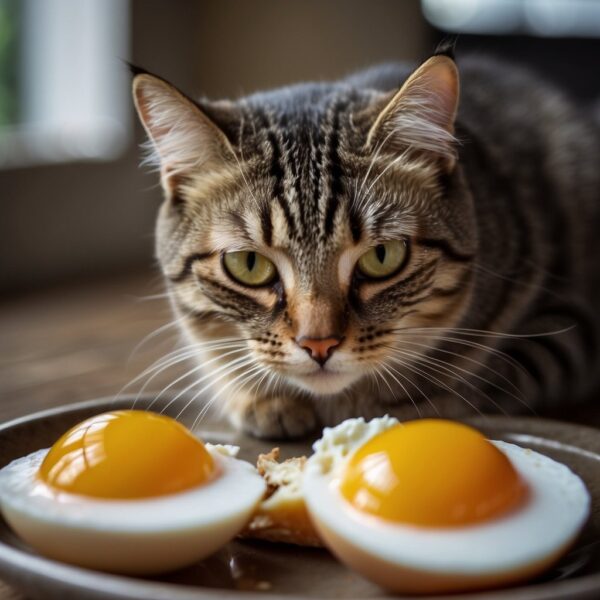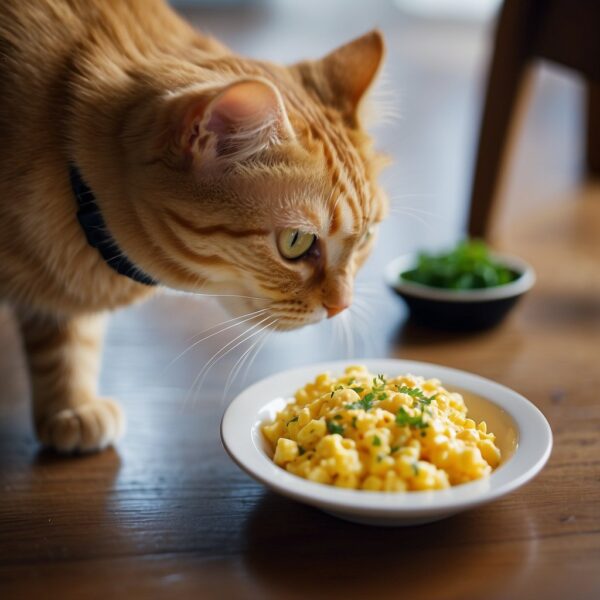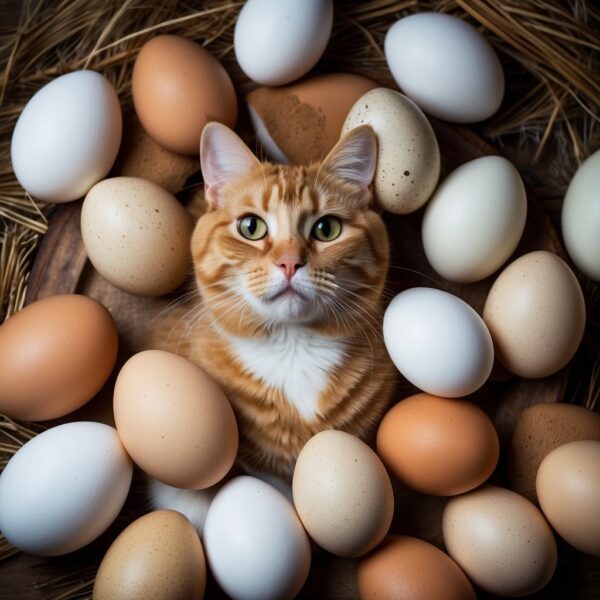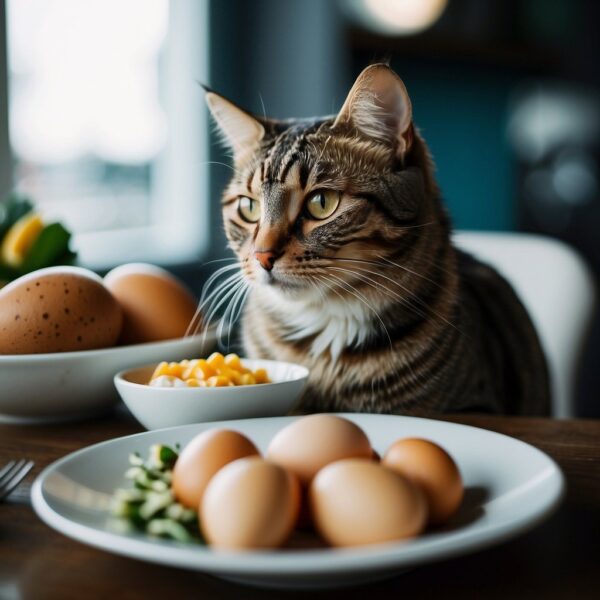
Cats Eating Eggs : High Protein and Essentials
When it comes to feline diets, there’s a lot of curiosity about whether certain human foods are suitable for cats. One common question is whether cats can eat eggs. To address this, it’s essential to understand that cats are obligate carnivores, which means that their natural diet consists mainly of meat. However, eggs are a source of high-quality protein and contain essential amino acids that cats need, so they can be a nutritious treat for your cat.
In moderation, fully cooked eggs can be a healthy addition to your cat’s diet, whether scrambled or boiled, provided they are prepared without salt, seasoning, or any additives that could be harmful to cats. Raw eggs should be avoided due to the risk of salmonella or E. coli, which can be detrimental to both your cat’s health and your own. Before introducing eggs or any new food into your cat’s diet, it is prudent to consult with a veterinarian to ensure it aligns with their specific dietary needs.
Key Takeaways
- Cats can safely consume fully cooked eggs in moderation as a supplement to their diet.
- Raw eggs should be avoided due to potential health risks from bacteria.
- Consultation with a veterinarian is advised before introducing eggs into a cat’s diet.
Benefits of cats eating eggs
Eggs are a nutritious addition to a cat’s diet, offering a rich source of protein and various vitamins for overall health. They contribute positively to a cat’s coat and skin health, muscle development, and digestive health when fed appropriately.
Coat and Skin Health
Eggs contain proteins and fatty acids that help maintain a healthy, shiny coat and skin. The vitamin A in eggs is crucial for skin repair and follicle health, while biotin helps prevent skin dryness and maintain a glossy coat.
Muscle Development and Maintenance
The high-quality protein in eggs supports lean muscle development and maintenance. Cats require a high protein diet, as they are obligate carnivores; thus, the amino acids provided by eggs are excellent for muscle growth and repair.
Cat Can Eat Eggs: Digestive Health
Eggs are not only nutrient-rich but also highly digestible, making them a beneficial treat for cats’ digestion. The natural enzymes in cooked eggs can aid in the digestive process, while the vitamin content, including B12 and riboflavin (B2), helps in food metabolism and energy production.

How to Feed Eggs to Cats
When feeding eggs to cats, it’s essential to ensure they are fully cooked and given in moderation, free from seasonings and other additives that could harm the feline.
Cooking Methods for cats eating eggs
Eggs should always be fully cooked before offering them to cats, as raw eggs can contain harmful bacteria. Cooking methods such as boiling or scrambling without any oil, butter, or fat are preferable.
- Scrambled Eggs: Cook on a non-stick pan without oil or butter.
- Boiled Eggs: Ensure eggs are hard-boiled, not soft-boiled, to eliminate any risk of salmonella.
Portion Control
Cats can eat eggs as an occasional treat rather than a staple of their diet. Providing eggs in small amounts prevents overfeeding.
- A few bites of an egg or a single small piece can suffice.
- Treats should constitute no more than 10% of a cat’s daily caloric intake.
Avoiding Seasonings and Additions
It is critical to avoid all seasonings, including salt, onion, and garlic, which can be toxic to cats. Eggs must be served plain.
- Scrambled Eggs: No salt or spices should be added.
- Boiled Eggs: Serve without any condiments or seasoning.

Cats and Different Types of Eggs
When considering incorporating eggs into a cat’s diet, it is important to distinguish between different preparations of eggs and their components, as these can impact a cat’s health and nutrition.
can cats eat eggs?: Raw vs. Cooked
Raw Eggs: Cats eating raw eggs is not advisable due to the risk of bacterial contamination like salmonella, which can affect both cats and humans. Additionally, a protein called avidin, found in raw egg whites, can inhibit the absorption of biotin (a B vitamin) and potentially lead to skin and coat problems.
Cooked Eggs: Cooked eggs, whether they are scrambled, boiled, or poached without seasonings, are considered safe for cats in moderation. Cooking eggs to an internal temperature of 160°F ensures the elimination of harmful bacteria and the deactivation of avidin, making the nutrients in eggs more accessible for cats.
Yolks and Whites in Eggs
Egg Yolks: While rich in fats and nutrients like vitamin A and D, iron, and fatty acids, egg yolks should only be offered in small amounts to prevent obesity and maintain balanced nutrition in a cat’s diet.
Egg Whites: Cats can eat cooked egg whites as they provide high-quality protein and are low in calories. However, all portions should be kept minimal to supplement their regular, complete, and balanced diet.
Eggshells and Their Safety
Eggshells: They are a source of calcium, which is vital for a cat’s bone health. However, it is essential to grind the eggshells into a fine powder to prevent choking or injury to the digestive tract.
Safety Consideration: Always ensure that eggshells are thoroughly cleaned and free from any residual egg contents to avoid bacterial contamination before serving as a dietary supplement. Ingestion should occur under a vet’s guidance to maintain the proper calcium-to-phosphorus ratio in a cat’s diet.
Risks of Feeding Eggs to Cats
While eggs can be a nutritious treat for cats, there are certain health risks associated with them. Responsible cat parents must consider these risks before introducing eggs to their cat’s diet.
cats eating eggs: Salmonella and Bacteria
Feeding raw eggs to cats carries a significant risk of bacterial infections such as salmonella and E. coli. These bacteria can lead to food poisoning, resulting in symptoms like vomiting and diarrhea. It’s crucial to cook eggs thoroughly to an internal temperature of 160°F to minimize this risk.
- Salmonella: Can cause vomiting, diarrhea, and lethargy.
- E. coli: May result in bloody diarrhea and severe dehydration.
Potential for Allergies from cats eating eggs
Although not common, some cats may exhibit an allergic reaction to eggs, leading to adverse symptoms such as skin irritation and gastrointestinal upset. It is important for owners to introduce eggs into their cat’s diet gradually and monitor for any signs of an allergy.
- Allergic Reactions: Can include itching, swelling, or digestive distress.
- Monitor Carefully: Watch for signs of discomfort or unusual behavior after consumption.
Nutritional Imbalance
Eggs should not replace a cat’s primary diet due to potential nutritional imbalance. Overconsumption can disrupt the balance of a balanced diet specifically formulated for felines. Furthermore, raw egg whites contain avidin, an enzyme that inhibits the absorption of biotin (a B vitamin), which can lead to skin and coat problems.
- Biotin Absorption: Avidin in raw egg whites can cause biotin deficiency.
- Balanced Diet: Eggs are a supplement and should not exceed 10% of the daily caloric intake.
Nutritional Profile of Eggs
Eggs are a rich source of nutrients, integrating essential proteins, healthy fats, and a wide spectrum of vitamins and minerals into a balanced diet.
Proteins and Amino Acids
Eggs are an excellent source of high-quality protein, which is vital for bodily functions. They contain all nine essential amino acids that cats need. Specifically, egg whites are packed with protein and are low in calories.
Fats and Healthy Fats
The yolk of an egg is where the majority of the fat is found, including healthy fats which are important for a cat’s diet. These fats help with the absorption of vitamins and provide energy.
Vitamins and Minerals
Eggs contain a variety of vitamins such as vitamin A, vitamin B12, vitamin D, riboflavin (B2), and biotin. Minerals such as selenium and zinc are also present, contributing to a cat’s immune health and enzyme function.
Caloric Content
The caloric content of an egg is moderate, with a single large egg containing about 70-80 calories.
Special Considerations for Kittens eating eggs
When introducing eggs to a kitten’s diet, it’s crucial to consider their unique nutritional requirements and the role of moderate portions in their growth process.
Developing Dietary Needs
Kittens have specific dietary needs that are essential for proper development. Eggs can be a beneficial part of a kitten’s diet as they are rich in nutrients and essential amino acids which are vital for growth. However, they should only complement a nutritionally balanced diet formulated for kittens.
- Vitamins: Eggs are a good source of vitamins such as B12 and riboflavin.
- Minerals: They provide minerals including selenium and iodine.
It’s important that any introduction of eggs to a kitten’s diet is done carefully to avoid disrupting their digestive systems.
Can Kittens eat eggs? Moderation and Growth
Moderation is key when feeding eggs to kittens. Their bodies are growing rapidly, and while eggs are nutritious, they should not replace a formulated kitten diet which ensures balanced nutrition.
- Growth: The high-quality protein in eggs supports muscle and tissue development.
- Moderation: Only small amounts of cooked egg should be given to prevent nutritional imbalances.
Feeding eggs should not interfere with the intake of their regular, age-appropriate food, which is tailored to support optimal development.
Consult a Veterinarian about cats eating eggs
When considering adding eggs to a cat’s diet, it is essential to consult with a veterinarian. A veterinarian can provide guidance on the appropriate portion size, which typically should not exceed a tablespoon, to prevent gastrointestinal issues. They can evaluate individual needs based on the cat’s health, age, and dietary requirements.
Determining Portion Size:
- Frequency: Occasional treat, not daily.
- Quantity: Generally, a tablespoon.
- Preparation: Cooked, not raw.
By seeking advice from a veterinary nutritionist, cat owners can ensure that any dietary changes, including the introduction of eggs, are balanced and beneficial to the cat’s overall health. A veterinarian will be able to identify any potential symptoms of food-related issues and guide the owner on how to monitor their pet for any adverse reactions that might indicate gastrointestinal issues.
Monitoring for Adverse Reactions:
- Watch for: Vomiting, diarrhea, or lethargy.
- Report: Any unusual symptoms should be reported to the veterinarian immediately.
- Adjust: The diet may need adjustment based on the cat’s reaction.
Veterinarians underscore the importance of cooking eggs thoroughly to an internal temperature that eliminates harmful bacteria, thus reducing health risks. Uncooked eggs pose a risk of salmonella or E. coli, which can affect both the cat and human members of the household. Proper cooking and handling are critical to safety.
Safety Precautions:
- Cooking: Ensure eggs reach an internal temperature that kills bacteria.
- Symptoms of infection: Vomiting, diarrhea, lethargy.
- Human risk: Proper hygiene to prevent cross-contamination.
In summary, professional input from a veterinarian or a veterinary nutritionist ensures that incorporating eggs into a cat’s diet is a safe choice tailored to the animal’s specific nutritional needs.

Frequently Asked Questions Cats EAting Eggs
Eggs can be a nutritious treat for cats when prepared properly, but it is essential to understand the specifics of how they should be served. The following subsections answer common questions about feeding eggs to cats.
Are scrambled eggs safe for cats to eat?
Scrambled eggs are safe for cats to eat as long as they are cooked without onion, garlic, salt, or other seasonings, which can be harmful to cats.
Is it dangerous for cats to consume raw eggs?
Feeding raw eggs to cats is not recommended due to the risk of foodborne illnesses like salmonella or E. coli, and a protein called avidin that can interfere with the absorption of biotin, a B vitamin.
How often can cats Eat eggs as a part of their diet?
Eggs should only be given to cats as an occasional treat. They are not a substitute for a balanced and complete diet tailored to a cat’s nutritional needs.
Can cats have eggs that are cooked with cheese?
While small amounts of cheese are generally safe for cats, its lactose content can cause digestive upset in some cats. It’s best to serve eggs without cheese to avoid possible issues.
Should cats be eating egg shells for nutritional benefits?
Egg shells can be a source of calcium but must be ground into a fine powder and given in small quantities to prevent choking and ensure proper nutrient balance.
What is the safest way to prepare eggs for a cat’s consumption?
The safest way to prepare eggs for a cat is to cook them thoroughly without any added ingredients like salt, spices, or dairy products to minimize the risk of digestive upset or toxicity.